Gilli Danda NCERT Solutions | English Santoor Class 5 - New NCERT PDF Download
| Table of contents |

|
| Let us Think (Page 80) |

|
| Let us Learn (Page 81) |

|
| Let us Speak (Page 84) |

|
| Let us Listen (Page 84) |

|
| Let us Write (Page 85) |

|
Let us Think (Page 80)
A. Answer the following questions
Q1: Which game does the poem mention? What are the things needed to play this game?
Ans: The poem mentions Gilli Danda. The things needed are a small gilli (a short stick) and a danda (a long stick).
Q2: According to the poem, how do the players feel while playing Gilli Danda?
Ans: The players feel joyful and free while playing Gilli Danda.
Q3: What happens to the tiny gilli when the stick strikes it?
Ans: When the stick strikes the gilli, it flies up high into the sky.
Q4: Which lines tell us that the children are playing the game outside?
Ans: The lines “Underneath the bright blue skies” and “Under the golden rays of the sun” tell us the children are playing outside.
Q5: What is the meaning of the line “our game is so sound”?
Ans: The line “our game is so sound” means the game is fun, exciting, and enjoyable.
Q6: Which word in the poem shows ‘happiness’?
Ans: The word “joy” shows happiness in the poem.
B. Think and discuss
Q1: Do you enjoy playing outdoors? Why or why not?
Ans: Yes, I enjoy playing outdoors because it’s fun, I can run freely, and it feels refreshing to play with friends under the open sky.
Q2: Name five outdoor games that you enjoy playing with your friends.
Ans:
1. Cricket
2. Football
3. Kho-Kho
4. Kabaddi
5. Hide and Seek
Let us Learn (Page 81)
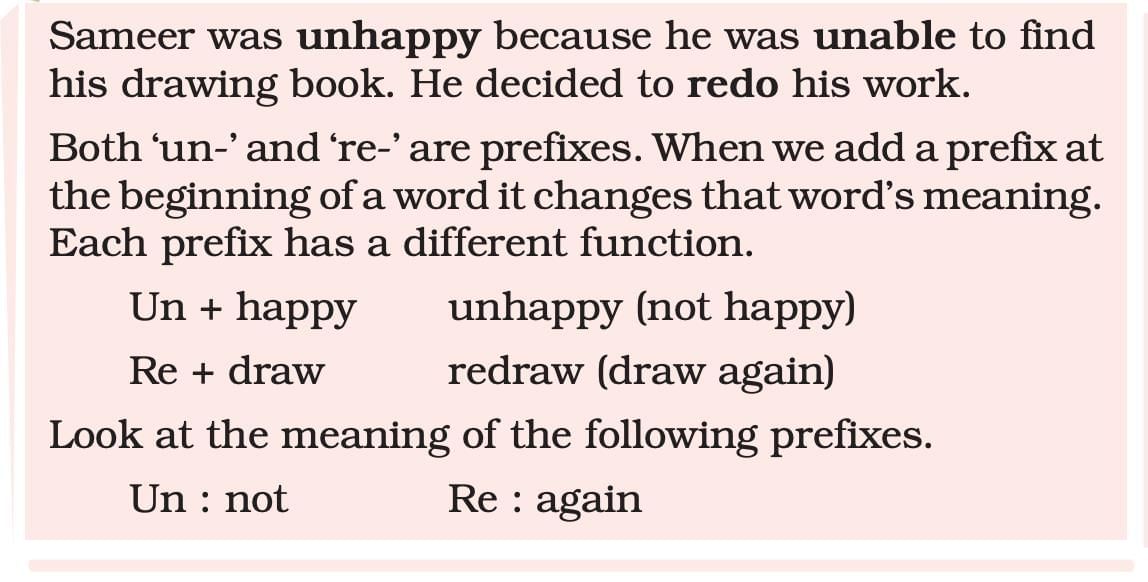
A. Add correct prefixes to the following words to create new words. Write the new word along with its meaning in the space given below.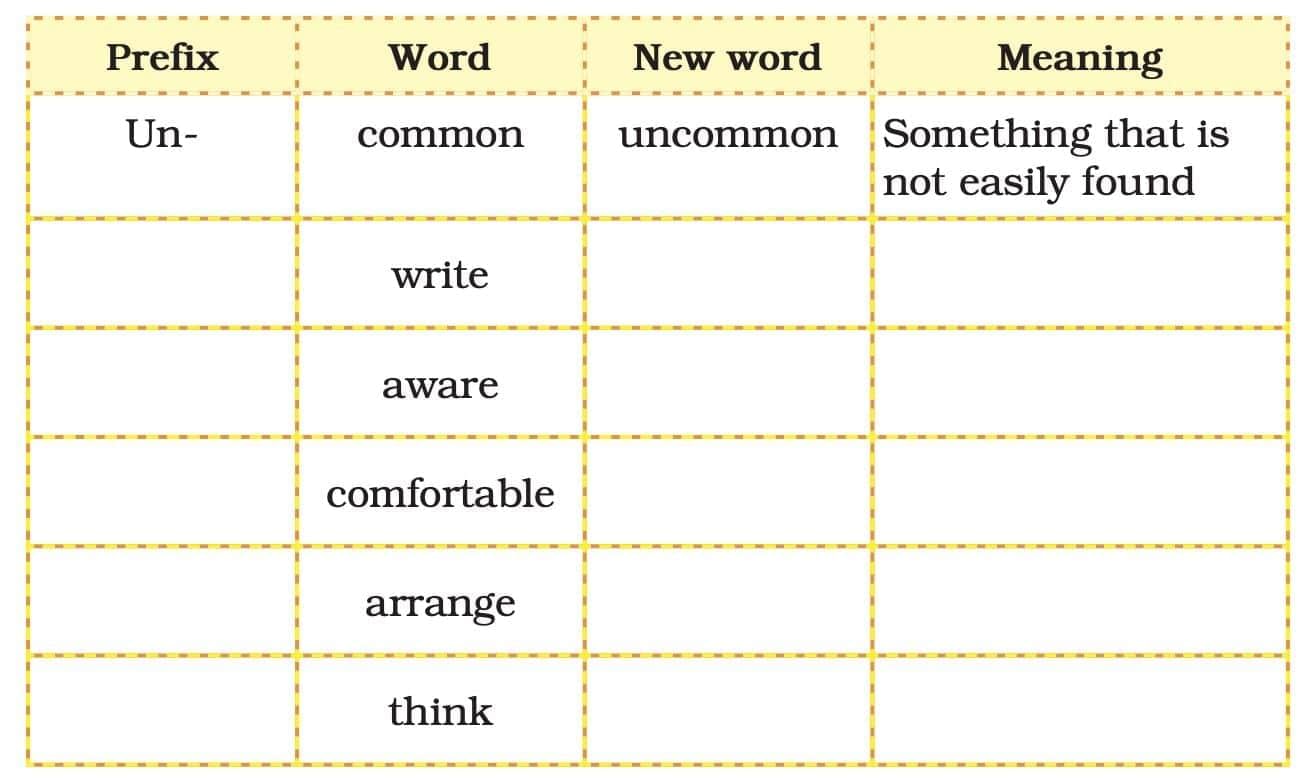
Ans: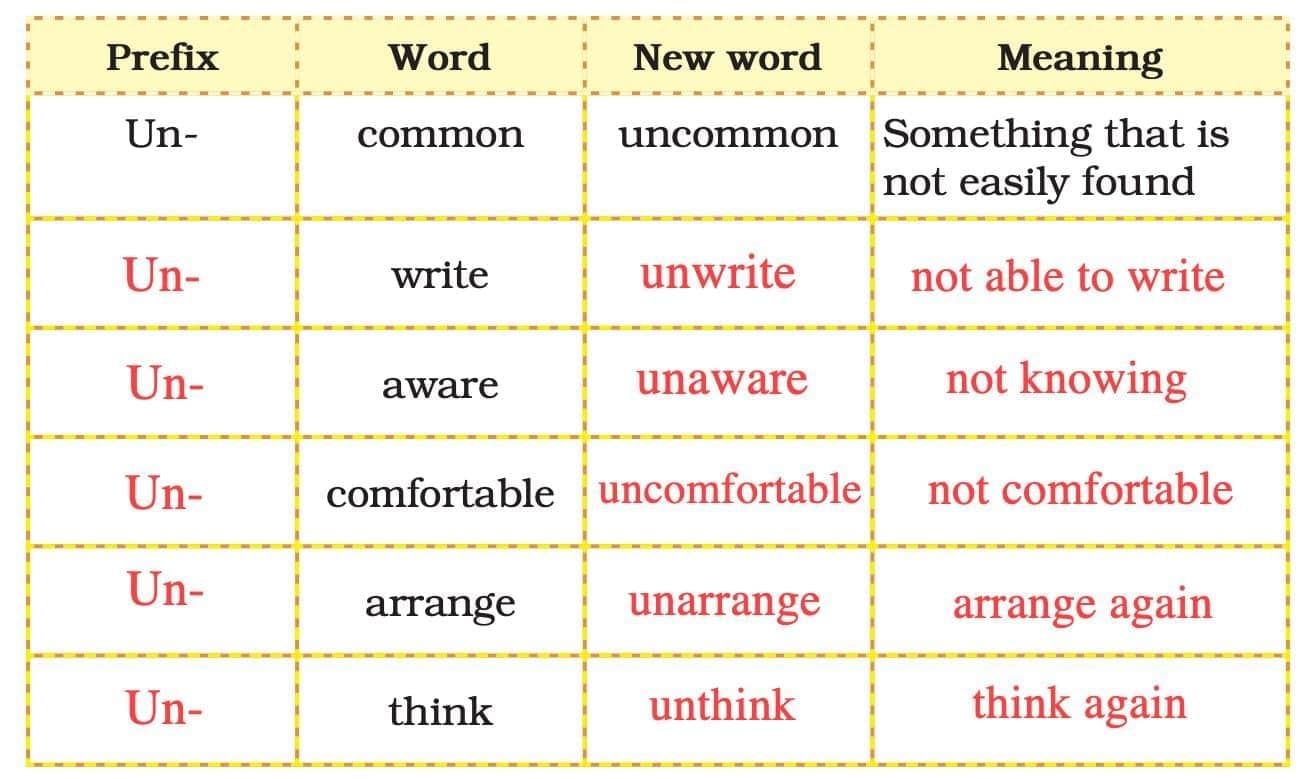
B. In the following table, encircle the nouns that you can see, taste, touch, or smell.
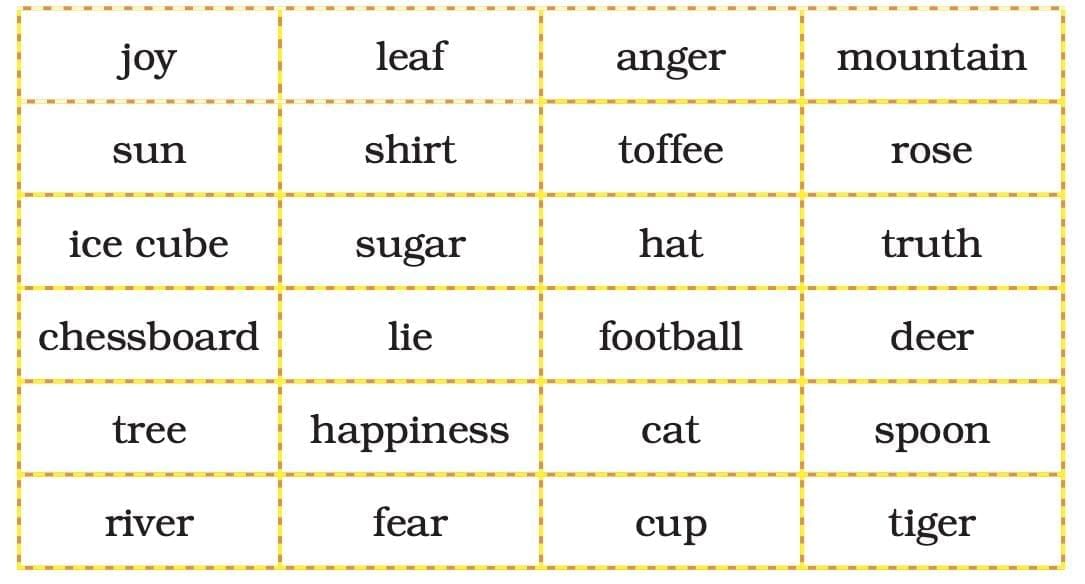
Ans:
The words that you have NOT encircled are abstract nouns. The word ‘abstract’ refers to something that has no physical shape. For example, ‘sadness’ is an abstract noun.‘Happiness’ and ‘rose’ are both nouns, but you can touch, see, and smell a rose. However, you cannot touch happiness. It is a feeling. Feelings, thoughts, ideas, etc., are all abstract nouns as they cannot be touched, smelt, or seen.
Additional Abstract Nouns: love, courage, sadness, honesty
Possessive pronouns indicate ownership or a relationship between people and things.
For example: 1. The book on the table is mine.
2. The red handbag is hers.
3. There is a new cycle near the gate. Is it yours?
C. Fill in the blanks with possessive pronouns
1. These crayons belong to me. These are..........................
2. The toy train belongs to Mudit. The toy train is ..........................
3. The house with the red roof belongs to my cousins. The house is ..........................
4. The little girl has bought a set of bowls to play Jal Tarang. The bowls belong to her. The bowls are ..........................
5. We have a cow with large brown eyes. The cow is ..........................
6. You should take better care of your things. After all, they belong to you. The things are..........................
Ans:
1. These crayons belong to me. These are mine.
2. The toy train belongs to Mudit. The toy train is his.
3. The house with the red roof belongs to my cousins. The house is theirs.
4. The little girl has bought a set of bowls to play Jal Tarang. The bowls are hers.
5. We have a cow with large brown eyes. The cow is ours.
6. You should take better care of your things. The things are yours.
Let us Speak (Page 84)

Name: Kho-Kho
Indoor/Outdoor: Outdoor
Number of Players: 9 players per team
Materials: Open ground, chalk to mark lines
Rules: One team chases while the other runs. Chasers tag runners by touching them. Switch roles after a set time. Safety: Avoid pushing; play on a flat surface.
Let us Listen (Page 84)
Listen to the teacher and respond with a matching action.
Ans: This is a classroom activity. Follow the teacher’s instructions:
1. “Swing and hit”: Pretend to swing a danda.
2. “Watch it go”: Raise arms as if watching the gilli fly.
3. “Laughing, playing”: Giggle or clap hands.
4. “Shade your eyes from the sun”: Place hands above eyebrows.
Let us Write (Page 85)
A. Find the meanings of the following words using a dictionary.
1. Quit 2. Gather 3. Swing 4. Underneath 5. Golden
Now, use each word in a sentence of your own.
Ans:
1. Quit: To stop or give up. Sentence: I will never quit playing Gilli Danda with my friends.
2. Gather: To come together. Sentence: We gather in the park to play games every evening.
3. Swing: To move back and forth or hit. Sentence: I swing the danda to hit the gilli high.
4. Underneath: Below or under something. Sentence: The gilli landed underneath the tree.
5. Golden: Bright yellow or precious. Sentence: The golden sun shines brightly during our game.
B. Rearrange the following to form a question and write them in your notebook. Remember to put a question mark at the end.
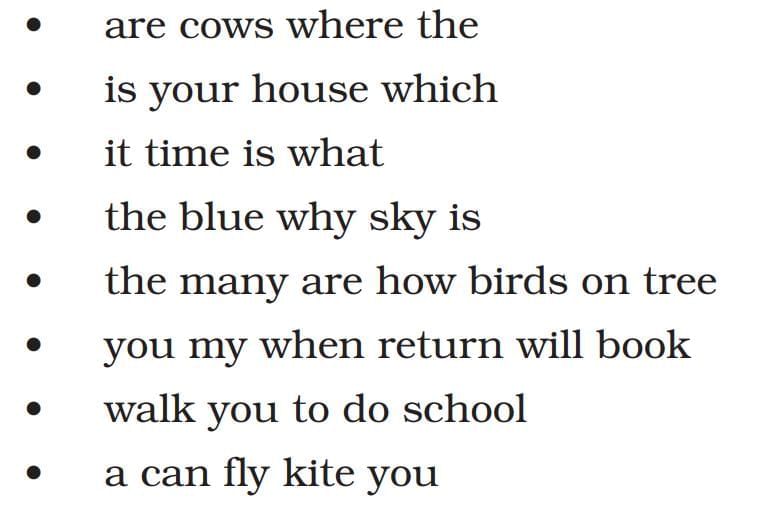
1. Where are the cows?
2. Which is your house?
3. What time is it?
4. Why is the sky blue?
5. How many birds are on the tree?
6. When will you return my book?
7. Do you walk to school?
8. Can you fly a kite?
C. The word ‘gilli ’ has a double ‘l’ in it. Similarly, the words ‘millet’ and ‘bullock’ have a double ‘l’.Now write three words having each of the double letters given below.
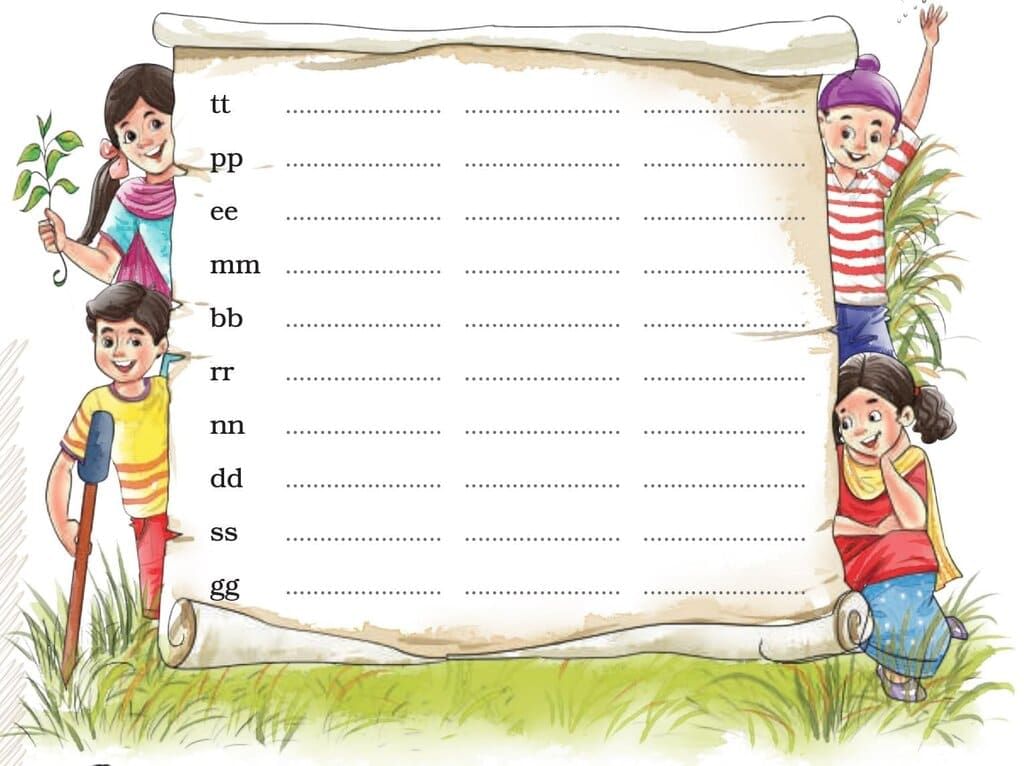
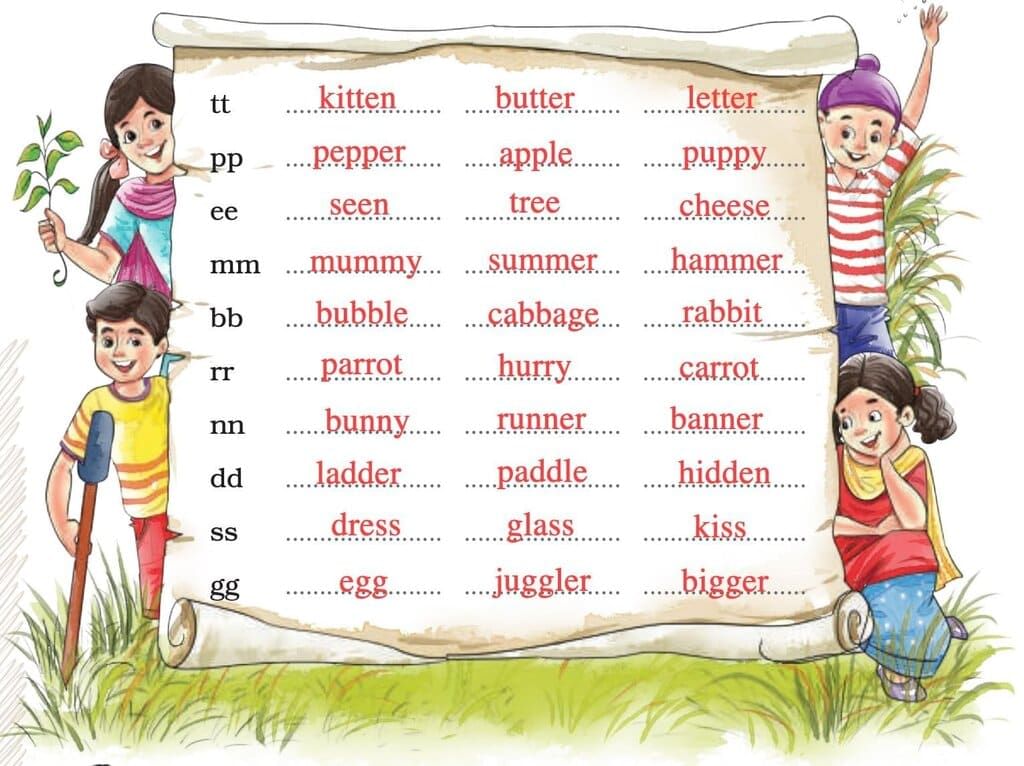
D. Circle the word that is different in meaning from the underlined word.

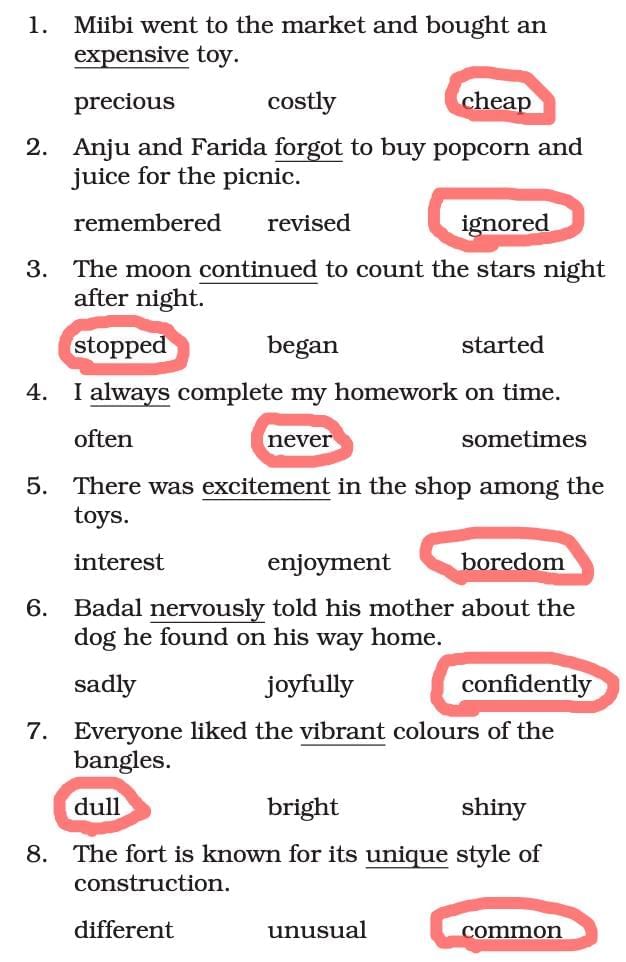
|
40 videos|489 docs|63 tests
|
FAQs on Gilli Danda NCERT Solutions - English Santoor Class 5 - New NCERT
| 1. What is Gilli Danda and how is it played? |  |
| 2. What skills does playing Gilli Danda develop in children? |  |
| 3. Are there any variations of Gilli Danda played in different regions? |  |
| 4. What materials are typically used to make the gilli and danda? |  |
| 5. How does Gilli Danda contribute to cultural heritage? |  |















